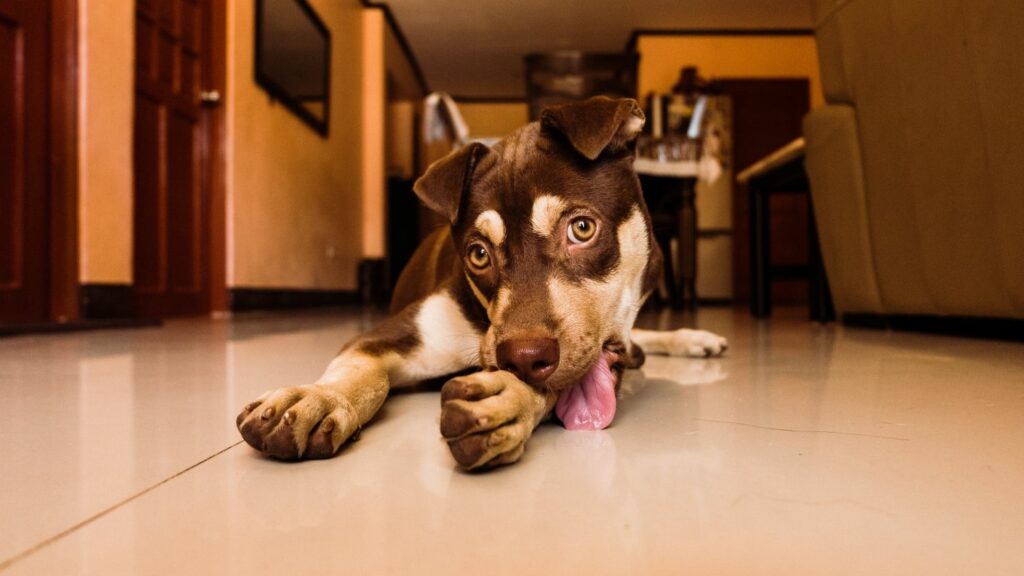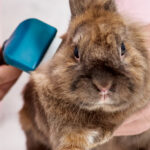Table of Contents
Excessive licking in dogs can be frustrating for pet owners and uncomfortable for the dogs themselves. Understanding how to stop a dog from licking excessively involves identifying the underlying causes and implementing effective strategies to address the behavior. This guide provides practical tips and techniques to help you manage and reduce excessive licking in your dog.

Understanding the Causes of Excessive Licking
To effectively stop excessive licking, it’s crucial to understand why your dog is engaging in this behavior. Common causes include:
- Anxiety or Stress: Dogs often lick excessively when they are anxious or stressed.
- Boredom: Lack of mental and physical stimulation can lead to excessive licking as a form of self-entertainment.
- Allergies: Allergies to food, environmental factors, or parasites can cause itching, leading to excessive licking.
- Pain or Discomfort: Dogs may lick excessively if they are experiencing pain or discomfort in a particular area.
- Behavioral Issues: Some dogs develop obsessive-compulsive behaviors, including excessive licking.
1. Addressing Anxiety and Stress
Anxiety and stress are common triggers for excessive licking. Here are ways to help your dog feel more secure:
- Provide a Safe Space: Create a comfortable, quiet space where your dog can retreat when feeling anxious.
- Use Calming Aids: Consider using calming aids such as pheromone diffusers, anxiety wraps, or natural supplements to help reduce stress.
- Consistent Routine: Maintain a consistent daily routine to provide your dog with a sense of security and predictability.
2. Ensuring Proper Exercise and Stimulation
Boredom is a significant factor in excessive licking. Providing adequate exercise and mental stimulation can help:
- Daily Exercise: Ensure your dog gets sufficient physical activity through daily walks, playtime, and interactive games.
- Interactive Toys: Use puzzle toys, treat-dispensing toys, and other interactive toys to keep your dog mentally engaged.
- Training Sessions: Incorporate regular training sessions to challenge your dog’s mind and provide mental stimulation.
3. Identifying and Treating Allergies
Allergies can cause itching and discomfort, leading to excessive licking. Identifying and treating the underlying allergies is essential:
- Consult Your Vet: Visit your veterinarian to identify potential allergens and receive appropriate treatment.
- Hypoallergenic Diet: If food allergies are suspected, switch to a hypoallergenic diet to reduce allergic reactions.
- Environmental Management: Minimize exposure to environmental allergens such as pollen, dust, and mold by keeping your home clean and using air purifiers.
4. Managing Pain and Discomfort
If your dog is licking excessively due to pain or discomfort, addressing the underlying issue is crucial:
- Veterinary Check-Up: Schedule a veterinary check-up to diagnose and treat any medical conditions causing pain.
- Pain Relief: Administer prescribed pain relief medications as directed by your veterinarian.
- Topical Treatments: Use vet-approved topical treatments to soothe irritated or inflamed areas.
5. Behavioral Modification Techniques
For dogs with behavioral issues leading to excessive licking, behavioral modification techniques can be effective:
- Positive Reinforcement: Use positive reinforcement to reward your dog for not licking and redirect their attention to more appropriate behaviors.
- Training Commands: Teach commands such as “leave it” or “stop” to interrupt and redirect licking behavior.
- Consistency: Be consistent with your training and reinforcement to help your dog learn and adopt new behaviors.
6. Using Deterrents
Deterrents can help discourage excessive licking by making the experience unpleasant for your dog:
- Bitter Sprays: Apply vet-approved bitter sprays to areas your dog frequently licks to deter the behavior.
- Protective Clothing: Use protective clothing such as dog boots or bandages to cover areas prone to excessive licking.
- Elizabethan Collars: In severe cases, an Elizabethan collar can prevent your dog from accessing areas they excessively lick.
7. Professional Help
If the excessive licking persists despite your efforts, seeking professional help may be necessary:
- Consult a Behaviorist: A professional dog behaviorist can help identify the root cause of the licking and develop a customized treatment plan.
- Veterinary Advice: Your veterinarian can provide further recommendations and may refer you to a specialist if needed.
- Medication: In some cases, medication may be prescribed to help manage anxiety or compulsive behaviors.
Conclusion on How to Stop a Dog from Licking Excessively
Understanding how to stop a dog from licking excessively involves identifying the underlying causes and implementing appropriate strategies. By addressing anxiety, providing proper exercise and stimulation, managing allergies, treating pain, using behavioral modification techniques, employing deterrents, and seeking professional help if needed, you can help reduce and prevent excessive licking in your dog. Always consult with your veterinarian to rule out medical conditions and receive personalized advice. For more tips on pet care, visit the ASPCA and AKC.
FAQs on How to Stop a Dog from Licking Excessively
Why does my dog lick excessively?
Excessive licking can be caused by anxiety, stress, boredom, allergies, pain, or behavioral issues. Identifying the underlying cause is crucial for addressing the behavior.
How can I tell if my dog is licking due to anxiety?
Signs of anxiety in dogs include excessive licking, panting, trembling, pacing, and destructive behavior. Consult with your vet or a pet behaviorist for a proper diagnosis.
Are there any home remedies for excessive licking?
Home remedies include using bitter sprays, providing plenty of exercise and mental stimulation, and ensuring a balanced diet. However, it’s essential to consult with your vet for a tailored approach.
Can excessive licking be harmful to my dog?
Yes, excessive licking can lead to skin irritation, infections, and hair loss. It’s important to address the behavior to prevent these complications.
Should I use an Elizabethan collar for my dog?
An Elizabethan collar can be useful in severe cases to prevent your dog from accessing areas they lick excessively. Use it as a temporary measure while addressing the underlying cause.
When should I consult a veterinarian about my dog’s licking?
Consult your veterinarian if the excessive licking persists, is accompanied by other symptoms, or causes skin damage. A vet can help identify and treat the underlying cause.











